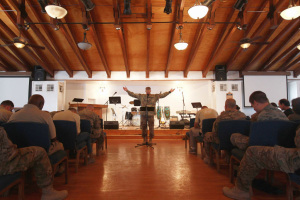Martin Luther, Ignatius Loyola, and Protestant Reformation
This week, Geoff Tunnicliffe, head of the World Evangelical Alliance representing 600 million Evangelicals, had a positive meeting with Pope Francis, representing 1.2 billion Roman Catholics. More and more we hear of Evangelical and Roman Catholic collaboration. What is happening in these relationships now as we quickly approach the 500th anniversary of the beginning of the Protestant Reformation, October 31, 1517?

The Reformation was a precious but complex step in Church history, where the beloved Biblical teachings of the amazing grace of God were renewed. We are all beneficiaries – Protestant, Roman Catholic, and everyone else. What can we learn from Martin Luther, Ignatius Loyola and others from that era – and especially from the Living Lord now – so that we can approach this 500th anniversary with a renewed awareness of the Lord and his purposes for his whole Church?
The Living God, the true Head of His Church, had awakened a passionate, devoted, young minister Martin Luther (1483-1546) to some of the failings of his Church. The issues were multiple – including the gross abuse of ministerial authority and power, the shifting show of outward religion replacing real godly contrition, the taking from the poor in the name of serving the poor, and dead institutional dominance displacing divine grace and Gospel. It is shocking how easily "formaldehyde faith" can displace vibrant faith and faithfulness to the Living Lord Jesus – and the multifaceted crises that led to the Reformation are certainly prime examples.
Luther initiated the reforming process with 95 pithy statements – his famous "95 Theses" – for discussion and debate. It was on October 31, 1517, when Roman Catholic priest Martin Luther opened the timely debate concerning the amazing grace of the Lord. Many Church leaders of Luther's time had submerged the teachings of God's grace through perverted power, twisted theology and bureaucratic dysfunction.
Luther's mission was to awaken the Church, but the authoritarian "Churchianity" structures of the time were too threatened, and they excommunicated and temporarily incarcerated Luther in an effort to silence him. In spite of Luther's own serious failings in other areas – including anti-Jewish and anti-Baptist injustices – Luther's voice for God's saving grace and for the powerful role of vibrant personal faith was effective. We have all benefited hugely from Luther's positive influence for free markets, civil rights, democracy, and liberty of conscience. For good reason, in 1935 Martin Luther King, Jr.'s father changed his own name and his son's name to become living monuments of this courageous giant of the Church.
Shortly after Luther's "95-Theses" earthquake, another Roman Catholic priest, Ignatius Loyola, (1491-1556) also sought to reform the Church and to give renewed attention to God's grace. In founding the "Society of Jesus," he was clear about his two top purposes: (1) to teach the Bible and (2) to bring people to Jesus. Even today, all Christians would do well to devote their lives to these two divine directives, both rooted in Jesus' Great Commission.
With his focus on the Living Lord and his saving grace, Loyola, like Luther, was treated with great suspicion by the corrupt ecclesiastical authorities. However, when some sought to excommunicate Loyola, too, they failed. While Loyola's work has been described as part of the "Counter-Reformation," it was nevertheless very much in harmony with the basic purposes of the Reformation to correct the Church by (1) empowering the people with Biblical knowledge and (2) enlivening the people's vibrant relationship with the Lord Jesus.
While actively "countering" some of the destructive divisiveness of the Reformation, Loyola actively ministered Biblical reform from within – both within the spiritual walk of individual people and within the walls of the institutional Church. Ironically, the "Counter-Reformation" then was generally within the Bible-based purposes of the Reformation. For good reason, many Roman Catholic leaders have considered members of the Society of Jesus (the Jesuits), the followers of Loyola, to be "closet Protestants," even "closet Evangelicals." However, what these leaders mean as a condemnation for Loyola's followers, we should interpret as high praise for both the Society of Jesus and for Evangelicals.
For ages, the Father General, the top Jesuit, has had offices right in the Vatican, close to the pope's offices – not because Jesuits were especially honored by reigning popes, but out of suspicion, to keep Loyola's followers under close scrutiny. And now, for the first time ever, the Roman Catholics have a pope who has been a long-standing leader within the Society of Jesus, a leading follower of Loyola.
This is good. This may be very good.
We all may have our justified suspicions – but the Living Lord Jesus endures as the Head of his Church, and we all need to honor the Head and obey what he says, most of all. Our Protestant, Eastern Orthodox and Roman Catholic traditions are all wonderful – but they cannot hold a candle to the Living Lord Jesus himself, the roaring Lion of Judah, the Lamb who was slain for us and who lives forevermore. While we honor how Jesus' Spirit has often led our Churches in the past, including through leaders like Luther and Loyola, let us honor and obey the Lord's own presence and teachings in the Bible even more. This Christ-centered approach would be the preference and the passion of both Luther and Loyola – and the best way to honor their legacies.
Specifically, the Living Lord Jesus' John 17 Prayer – including his petition that his followers would be as united as he and the Father are united – is still in the Bible. Thankfully, in his prayer Jesus said nothing about bureaucratic unity or ecclesiastical conformity – for good reason. Ecumenical "unity" is generally self-defeating, distracting, debilitating, deafening and even deadening. The greatest purposes are far too often completely diverted by "well-intentioned" prelates and potentates. Jesus himself was so deeply disappointed with even the most early fumbling efforts of his followers at being Church that six out of the seven letters he dictated to the Apostle John in Revelation 2 and 3 are highly critical. Even to the members of the prosperous Church in Laodicea, the Lord Jesus had to point out that they were completely ignoring him. He was knocking on the door of his own Church, which was keeping him outside.
Church can be wonderful. But Church with the Living Lord Jesus Christ fully in charge – that is so much better!
While we love Church, we understand why so many people are drawn to Jesus but cannot find him in Church. Too often, even Church leaders with good intentions squeeze Jesus out.
It is not a Giant Office that Jesus desires. We need not await pompous preachers, bossy bishops, confused committees, or beleaguered bureaucrats to do our Living Lord Jesus' bidding. When Jesus' Prayer pleads for unity, we need to question the voices that contradict him.
Salvation by grace through faith in the Living Lord Jesus Christ endures as the eternal Gospel message. Our saving faith remains defined in our vibrant faithfulness to Christ, privately and publicly. That is the one Gospel that perpetually transforms people and societies. Thankfully, even the most recent former pope, Benedict XVI, while he was pope, publicly endorsed Luther in an official message, overtly based upon Romans 3:23-24, which he gave to throngs of eager listeners in St. Peter's Square. On November 19, 2008, in the refreshing sermon "The Doctrine of Justification: from Works to Faith," he proclaimed that Luther was right all along to teach that salvation is by "faith alone."
Let us creatively explore the many ways we can now honor the best of the transformative guidance of Luther and Loyola, 500 years later in spite of their finite and sometimes flawed leadership. Let us now also demonstrate our own commitment to the Church and to her divine purposes especially by renewing our deep loyalty and loving devotion to the true leader of the Church, the Lord himself, most of all.





























